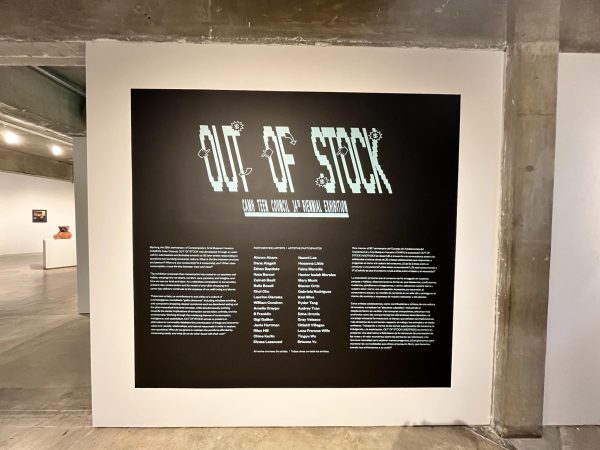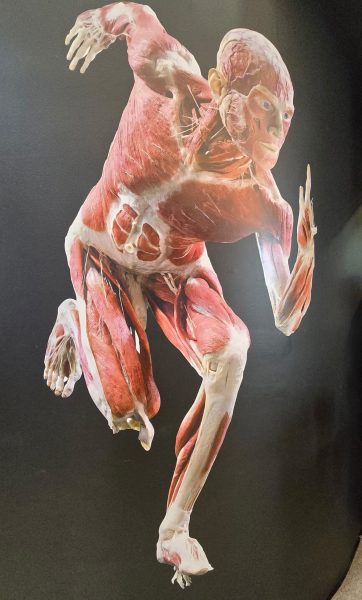Arctic Monkey’s new album “The Car” will weigh down your heart
Album cover of Arctic Monkeys’ “The Car.”
Sitting at the foot of my bed, I impatiently awaited the arrival of the lyrics, wondering whether or not I’d clicked onto the wrong album. I didn’t; the first song of Arctic Monkeys’ new album, “The Car,” actually began with a 56 second musical introduction, filled with slow melodic notes and jazz-like instrumentals. While the lyrics in their previous albums began within the first 10 to 20 seconds, I was left to listen to the somniferous clap of cymbals, feeling as though I were sitting inside a vintage jukebox with the same monotonous tune playing on loop.
The English rock band was established in 2002, starting off their career with a bang as their debut album, “Beneath the Boardwalk,” became the fastest-selling debut album on the UK Charts, reaching No. 1 on Jan. 29, 2006. The Arctic Monkeys were most known for their technique toward gaining popularity by handing out CDs at various gigs, being among the first artists to utilize the Internet and social media, more specifically Myspace, to promote their music.
Following the release of their award-winning “AM” album in 2013, I was greatly disappointed to find the drastic shift in music genre. Sure, the band is known for exploring numerous styles of music, from spastic punk to doomed stoner rock; however, it felt as though Alex Turner, Arctic Monkeys’ songwriter, ended up obscuring the themes of his music with the lounge-like singing, seeming far too relaxed compared to the strong impact lyrics. While “AM” felt like a romantic walk to watch the sunrise, “The Car” brought weight to my heart and exposed its audience to personal and deeper worries. Compared to its previous album, “The Car” is widely regarded as the band’s most melancholic work.
As the album begins, the slow, elongated buildup of “There’d Better Be A Mirrorball” takes away from the memorability of the opening, lacking the iconic punch of “AM” and its undulating riff and glam-styled percussion in their hit song “Do I Wanna Know?” The hypnotic beats of “There’d Better Be A Mirrorball,” followed by the distant longing and desire to the target seem washed out by dismissive lines of “Don’t get emotional, that ain’t like you / Yesterday’s still leaking through the roof.” The opening lines are heavily contrasted to the underlying theme, as the chorus reveals Turner in a state of defeat, accepting that his love interest would “walk [him] to the car,” knowing he’ll “have a heavy heart.” The lyrics lead the audience into a series of mixed feelings, wondering whether the desperate and desire-filled lines mean to seem hopeful for mirrorball, or remorseful of his loss.
The next song, “I Ain’t Quite Where I Think I Am,” completely diverges from its initial harmony. It momentarily picks up the album’s pace with a faster melody of a supposed party setting. Thus, the track includes a vague comparison of a party and islands, including “the disco strobes in the stumbling blocks,” which could possibly refer to the album’s opening song. The lyrics lack a sense of solidity, leaving its audience to guess at the true meaning which Turner is trying to convey. Unlike the “AM” album, they lack a singular unified genre, with one almost an almost hopeful jazz piece and the other dabbling in funk, making it difficult to appropriately label the album under a certain style of music.
Later on, “Sculptures of Anything Goes” completely strays from the previous ideas of loss and regret, said to be Turner’s way of addressing the negative reception of the band’s recent works. Lines “Puncturing your bubble of relatability / With your horrible new sound” reflect the band’s awareness of their abnormal take on artistry, accompanied by the belief that they are being confined to the genre of their “AM” album. In response, he includes a message reinforcing their musical choice and how “those mixed messages ain’t what they used to be.” However, other fans argue that the lyrics are referring to an ex-romantic interest, following a somewhat running theme of love and loss. Outside of Arctic Monkey listeners’ rising theories, it isn’t abundantly clear what Turner’s abstract lyricism is referencing.
As the album goes on, the succeeding songs all glaze over a similar topic and meld together, particularly due to the reason that this album in particular focuses on the atmosphere which their melody creates, primarily a melodramatic scene of longing and doubt. None hold a strong standpoint and create the same recognizable feel with the simplistic yet complex, clever yet “unorthodox” elements from songs such as “Do I Wanna Know.”
Overall, the album itself lived up to its name: a precedent of their “AM” album. While the lyrics held intense, soulful meaning, the melodies blended together into one monotonous cluster of piano and percussion, where no track seemed to particularly stick out, and no instrumental seemed to particularly catch my attention. In addition, the proclaimed indie-rock band had felt more like a jazz-funk band, generally creating a hard-to-grasp idea.
While I’d like to acknowledge the album’s unique perspective and style, it definitely was not within my favorite songs nor albums, as the all-over-the-place beat and uncertain meanings seemed far more disorderly compared to their “AM” album.
Your donation will support the student journalists of Carnegie Vanguard High School. Your contribution will allow us to cover our annual website hosting costs and fund field trips, competition fees, and equipment. We appreciate your support!

Cat is a sophomore on the Carnegie competitive dance team and enjoys reading, more specifically fantasy genres, and writing in their free time. They also...







John Nguyen • Nov 14, 2022 at 9:42 am
Wonderful review! I enjoyed the album and similarly agreed with your opinions.